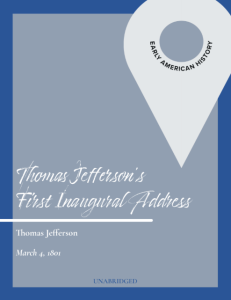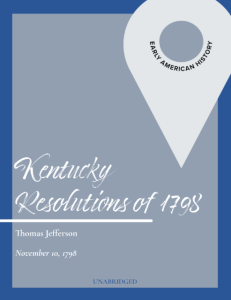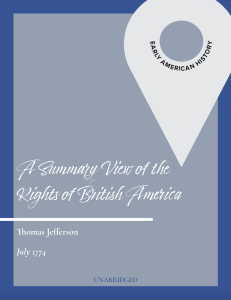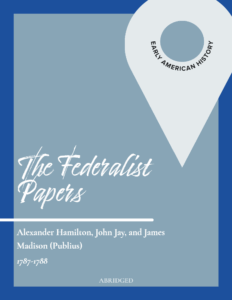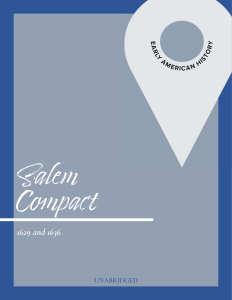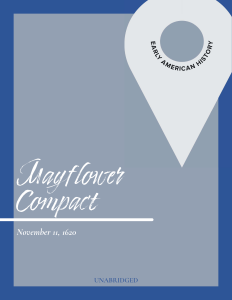
The American Revolution was held together by trust.


Capital determines whether a society will be prosperous or poor, well-fed or not, populated by independent and self-reliant citizens or dependent subjects. An abundance of nutritious food, clean water, sturdy homes, safe modes of transportation, reliable sources of heat and power, modern medicines, and many other products and technologies that improve the quality of human life are impossible without capital.
A teacher can help students understand what capital is by encouraging them to think of capital as an individual’s “starter pack” for being productive and getting things done. Capital includes the tools, money, and other valuable resources a person needs to create something of value, or to solve a problem in order to create wealth.
For example, if you wanted to start a lemonade stand, the money you use to buy cups, lemons, water, and a sweetener is capital. While money is an important form of capital, capital can include other resources that help you create wealth for yourself by producing value for others.
Other Kinds of Capital:
Capital is anything you can use to “build” something that will provide experiences of value for other people. Money is the most obvious example of capital, but creativity, friendships, and even your honesty and intelligence, can be just as important, maybe even more important in some circumstances.
So, yes! Capital is cash and more: Capital includes any resource that helps you be more productive. Ask students: What kinds of capital do they have? Maybe it is their energy, ideas, or even their ability to make people laugh. Remind them that everyone—even people with little or no money—have important capital over which each person has much control: A person’s own reputation, honesty, and trustworthiness.
Evaluating incentives
One of the most important questions within any society is: Who will allocate capital? One possibility is that individuals choose whether, how, when, where, and why to spend their own money and invest their own capital. Another option is that political elites within government will tax citizens and confiscate the wealth that others have created, and then those in government will choose how to allocate other people’s their capital.
Individuals choosing how to invest their own capital have strikingly different incentives than politicians and bureaucrats in government spending other people’s money.
As we discuss in another section, profit is the happiness of other people. When individuals and business owners make their own choices about how to allocate and when to invest their own capital, they aim to earn a profit—they want a return on their investment—which is another way of saying they’re trying to make other people happy by producing value for them.
When those in government choose how to spend other people’s money, they serve their own interests, usually by expanding the scope and power of government. That is worth repeating: Business owners allocate their own capital in order to make a profit for themselves by making other people happy; government allocates other people’s capital in order to extend the power and control of government.
Every new government spending program, after all, requires expanding the class of unelected bureaucrats, adding new levels of control over what citizens may do, and adding new kinds of taxpayer-funded government competition to businesses and other private organizations.
Incentives of Allocation
For politicians and bureaucrats, resource allocation often means achieving political ends or aiming for short-term gains. Without direct knowledge of costs or profits, these decisions can be quite unpredictable.
When private individuals choose how to invest or spend their own money, they have strong incentives to make careful, strategic decisions. If they invest wisely, they personally reap the rewards; if they invest foolishly, they suffer the losses. This direct link between decisions and consequences encourages efficiency and accountability. Individuals are motivated to seek the highest return (or best use) for their funds, and they also bear the risk of losing their capital if a project fails.
By contrast, when those in government take capital from citizens through taxation, politicians and bureaucrats end up allocating resources that are not their own. As a result, several distortions can arise:
In short, when individuals allocate their own funds, they have personal incentives—financial risk and reward—to be careful stewards of their capital. When governments collect taxes and decide how to spend them, officials are allocating other people’s funds and often do so under weak or no incentives for efficiency, with less direct accountability for mistakes, and with political or bureaucratic considerations that can overshadow the goal of maximizing societal well-being.
 Nº1
Nº1
Description
Download PDF Download ePub Button 3
The Signers of the Declaration of Independence concluded with a famous and solemn pledge: their lives, fortunes, and sacred honor. This was no small matter. What they called “revolution” was, from the British perspective, treason against the Crown—punishable by death.
Yet, the Signers stood firm, launching the greatest experiment in self-government the world has ever witnessed. This movement was held together by a powerful kind of social and political glue: trust.
The pledge they made was not to God or to the general public—it was a promise to each other. They understood that if some broke that trust when challenges arose—and the challenges would soon become daunting—others might do the same, and the revolution would fail.
Betraying their mutual trust would likely mean that each would die in vain and that freedom would have to wait for another time and place. Instead, they honored their trust at great costs paid in blood, money, and suffering.
Our freedom today—or what remains of it—is the legacy of their extraordinary loyalty to and trust in one another.
Without mutual civic trust, there could have been no American Revolution, no American Founding. Freedom, after all, depends on citizens trusting one another enough to govern themselves: to run their businesses as they see fit, to raise and educate their children responsibly, and to make their own choices and live with the results.
Live and let live is the attitude of free men and women, an attitude rooted in trust.
The Founders recognized an important reason free citizens can trust one another: None of us, as ordinary individuals, has the legal power to confiscate property or violate the rights of others. I cannot take what belongs to you—by law—or dictate how you must live, and you cannot do the same to me. Neither of us poses the threat of legalized force to the other. This mutual limitation is why we can trust one another.
As ordinary fellow citizens, should one of us steal from or violate the rights of others, it would be a breach of law, not a rightful exercise of legal authority. The criminal and civil codes exist precisely to restore justice when citizens act unjustly toward each other.
There is, however, one group of people who do possess and exercise legalized force: those in government. Government alone holds the monopoly on legalized force, which is why government issues commands (such as paying taxes), not requests.
This is precisely why, as the Founders argued, we ought to distrust those in government: Those who have their hands on the levers of government power are often tempted to abuse or misuse that power. It is why We the People ratified a Constitution that limits the powers we have delegated to those who serve within our government.
As Thomas Jefferson famously wrote in the Kentucky Resolutions of 1798:
– [F]ree government is founded in jealousy and not in confidence; it is jealousy and not confidence which prescribes limited Constitutions to bind down those whom we are obliged to trust with power.
In short, freedom rests on two pillars: wide mutual civic trust among fellow citizens and distrust of government power. Only by maintaining this delicate balance can liberty endure.
